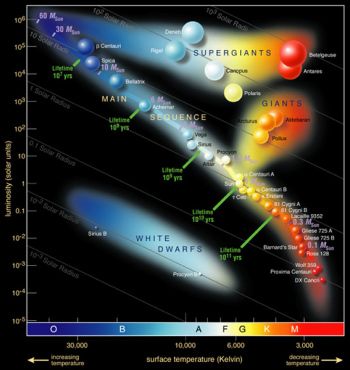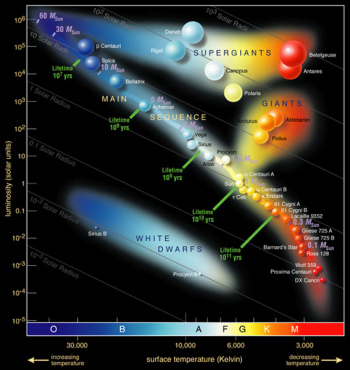The World at the End of Time Book Review


Hertzsprung–Russell diagram
by Frederik Pohl
Del Rey 1990
$12.95; 393 pages
ISBN 978-0345339768
I was lent this book by a friend. I had never read anything by Frederik Pohl before, but I knew of him because he wrote the introduction to the collection of Cyril Kornbluth's short stories that I read recently.
This was a cracking good read. Hard scifi, mildly didactic regarding stellar astrophysics, along with some reasonable speculations about setting up colony ships that cannot travel faster than light. Pohl played around with General Relativity and some of the proposals that have been floated to unify gravity with the electroweak forces.
I found the main character thought-provoking. Viktor Sorricaine is perhaps a bit of an anti-hero; it takes him until the end of time to stop being a selfish bastard. Nonetheless, I found Viktor likeable, and I could easily get inside his head even when he did things that made me cringe [perhaps in self-recognition?]
The other main character, whose life unexpectedly parallels Viktor's, is Wan-To. Wan-To lives inside a star, possesses immense power, has a lifespan measured in very large exponents, and has the ethics of a toddler. I actually find this plausible. Wan-To's life, which spans nearly the whole interval from the Big Bang to the heat death of the Universe, is remarkably static. What Wan-To reminds me of is an angel, albeit a fallen one.
St. Thomas Aquinas is known as the Angelic Doctor because he spent a great deal of time speculating about what what angels are like. This is primarily of interest because Thomas used angels as a thought-experiment: he tried to discern how a mind worked by thinking about things that are nothing but a mind, and deducing what properties they must have. One of the properties of an angel is that they are immaterial, minds without bodies.
Pohl describes Wan-To as something very much like Aquinas' disembodied intelligences, except that Wan-To very much has a body, albeit one composed of plasma. What is similar is that Wan-To largely lacks the capacity to change. Part of what makes the material material is the ability to change from one form to another. Immaterial things, by definition, lack this ability.
Since Wan-To is actually material, he can change a bit, but his life history is so slow that it takes him a very long time to do so. Unlike humans, who are so very fragile and perishable, but who possess a remarkable ability to change very much over their short lifespan. There is a venerable conceit in literature that our transitory nature is really our greatest strength. Dante and Milton suggested that the fallen angels in particular, envy us, because a human being can make an entire lifetime of mistakes, and yet be redeemed at the end by a singular act of contrition, whereas an angel only ever gets one choice, without any possibility of redemption.
A more recent example from the same tradition is J.R.R Tolkien's The Lord of the Rings. The relatively eternal and blessed elves lose the world to the raucous and fecund men, precisely because Tolkien's elves lack the capacity to adapt to changing circumstances. A similar idea is at work in Pohl's book, but is only implied. Like the elves, Wan-To's long life, and the very few creatures like himself that he encounters, render his conceptual universe small and fixed. Despite the unspeakable eternities that Wan-To experiences, nothing happens to him. Accordingly, he has few opportunities to learn from his mistakes, or see that someone else has done it different and better.
Wan-To lacks socialization: he completely lacks the common human experience of being raised by someone older and more experienced. All he has are his [admittedly ample] wits and native powers. Against any mere human, or human-like creature, Wan-To is clearly superior. However, in a Providential occurrence, Wan-To's destructive attempts at self-preservation purify a remnant of humanity of the Thanatos impulse by accidentally flinging them to the end of time. Conflict is created thereby, because the nuclear energy of the suns the humans enjoy is unique in the dissipated universe at the end of time, and Wan-To, being material, needs energy to survive. Pohl leaves us with an inevitable future collision between Wan-To and the sons of man. Strongly implied, I think, is that Wan-To will be tested, and found wanting, when this lesser Day of Judgment arrives.
Comments ()